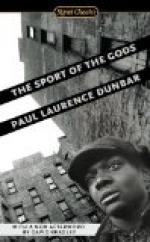This was but for an hour, for even while they exclaimed they knew that there was no way, and that the stream of young negro life would continue to flow up from the South, dashing itself against the hard necessities of the city and breaking like waves against a rock,—that, until the gods grew tired of their cruel sport, there must still be sacrifices to false ideals and unreal ambitions.
There was one heart, though, that neither dismissed Joe with gratuitous pity nor sermonised about him. The mother heart had only room for grief and pain. Already it had borne its share. It had known sorrow for a lost husband, tears at the neglect and brutality of a new companion, shame for a daughter’s sake, and it had seemed already filled to overflowing. And yet the fates had put in this one other burden until it seemed it must burst with the weight of it.
To Fannie Hamilton’s mind now all her boy’s shortcomings became as naught. He was not her wayward, erring, criminal son. She only remembered that he was her son, and wept for him as such. She forgot his curses, while her memory went back to the sweetness of his baby prattle and the soft words of his tenderer youth. Until the last she clung to him, holding him guiltless, and to her thought they took to prison, not Joe Hamilton, a convicted criminal, but Joey, Joey, her boy, her firstborn,—a martyr.
The pretty Miss Kitty Hamilton was less deeply impressed. The arrest and subsequent conviction of her brother was quite a blow. She felt the shame of it keenly, and some of the grief. To her, coming as it did just at a time when the company was being strengthened and she more importantly featured than ever, it was decidedly inopportune, for no one could help connecting her name with the affair.
For a long time she and her brother had scarcely been upon speaking terms. During Joe’s frequent lapses from industry he had been prone to “touch” his sister for the wherewithal to supply his various wants. When, finally, she grew tired and refused to be “touched,” he rebuked her for withholding that which, save for his help, she would never have been able to make. This went on until they were almost entirely estranged. He was wont to say that “now his sister was up in the world, she had got the big head,” and she to retort that her brother “wanted to use her for a ‘soft thing.’”
From the time that she went on the stage she had begun to live her own life, a life in which the chief aim was the possession of good clothes and the ability to attract the attention which she had learned to crave. The greatest sign of interest she showed in her brother’s affair was, at first, to offer her mother money to secure a lawyer. But when Joe confessed all, she consoled herself with the reflection that perhaps it was for the best, and kept her money in her pocket with a sense of satisfaction. She was getting to be so very much more Joe’s sister. She did not go to see her brother. She was afraid it might make her nervous while she was in the city, and she went on the road with her company before he was taken away.




